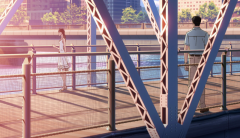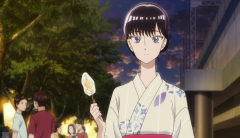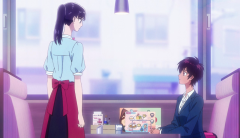I suppose that most of us, even the perministic ones, enter After the Rain (Ameagari) with some reservations. After all, the premise about a crush from an 18-year-old girl to the store manager who is nearly 30 years senior raises a lot of red flags here. Yet the show handles this tricky premise with deep insight and offers us two of the more well written characters out there. Originally billed as a romantic drama, the last third of Ameagari steers away from any romantic tension to deliver something more profound. It explores the complexity of human emotion by examining the unlikely relationship between two individuals with broken dreams and how they influence each other to reach back their goals. While I’d love for the conclusion to be more impactful (the ending suggests their relationship is like… ahem… after the rain: fleeting, soft, momentary – I’d prefer for more storming here), this show remains one of the most intimate, sensitive – and ultimately – complex portrayal of bonding, and human relationship. This solid material is further elevated by the understated and strong visual storytelling, aesthetically pleasing visual presentation and color palette and one of the best soundtrack in recent years. Ameagari is pretty much excellent as a whole package.
Any decent romance story has to start with well-grounded and relatable main leads, and Ameagari offers us two characters that worth caring for. Both Tachibana and Kondou are complex characters, especially Kondou who first appears as a goofy likable old man, but through the course of its run, their personality, and their own dreams are revealed slowly. Behind their composure, there lies a huge disappointment of their current lives, and as we know them better, we learn that they have left behind the path they used to treasure the most – Tachibana with her injury that prevents her from running track again and Kondou with his passion for Japanese literature – and gradually lose the essence of who they really are, becomes a shell that has no more dream or desire (in one of the show’s most clever symbolism: he touches the shell of a cicada while speaking that lines).
Meanwhile, Ameagari follows mostly through the point of view of Tachibana. While the show’s never shy from exploring Kondou’s inner thoughts (and what poetic thoughts this guy has), we follow Tachibana mostly through visual cues: her gestures, her “sparkling moments”, the looks from her eyes. Why this difference in treatment? By giving Kondou an inner voice, we become certain that his feeling for Tachibana isn’t romantic or sexual interest, but more about how her reminds him of his own youth and his current lifeless life. For Tachibana, it’s more about fleeting first crush and the show more than nails it underlining those feelings with sensitivity of how first crush is like. As you can guess from the title, rain is the show’s motifs here, and it chronicles the progression of this romance, from gentle, quiet rains in the beginning, then “she comes like a rain” in the middle and bright in the end like a love after the rain.
The main selling point of Ameagari is undoubtedly the amazing chemistry between Tachibana and Kondou. Their back-and-forth exchanges always spark with so much dynamic that every time those two together, they’re bounce to have special moments together – a praise that you won’t hear me say often, especially in anime medium. We have The Confession, The Hug, the Kiss, The Final Confrontation… These moments are the highlights of not only this season, but for my money for the entire 2018 year. They’re impactful. They’re powerful. They’re just perfect. But even in those slower moments, whenever Tachibana and Kondou are seen together, they deliver a natural and positive influence on each other.
The supporting cast help expanding the lives of our two characters, although in retrospect, they still leave a lot to be desire. Chief among them is the inclusion of Kase in one particular episode that leaves a sour taste in the mouth for most of us, but what bad is the way he reverts back to background character and we never learn much about him again. Tachibana best friend, Haruka, receives more attention in the second half and she provides a welcomed conflict to Tachibana’s current crisis, but it feels unfocused when we have a section about her and the ex-captain of the football club (it’s as important as the second copy of the second will). Kondou’s long-lost friend Chihiro, on the other hand, provides an excellent supporting role by the way he counters Kondou about his writing’s passion or reflects further to the path of life that Kondou left behind.
The visual presentation of Ameagari furthers elevate this sensitive love story and makes it a total feast to the eyes. I admit that I didn’t have a high opinion to Wit Studio, mostly because the production approach in Attack of Titan was my least favorite, but I have totally changed my mind with this subtle yet gorgeous visual styles of Ameagari. The reason I bring up Wit studio in particular is because they have their own “make-up animation” team, which is a team who apply special effects to certain important scenes and they sure did the job marvelously here with downright impressive visual palette and strong direction. The soundtracks are simply mesmerizing. They not only bring out the best emotionally from these moments, listen to them alone can transfer you right back to these certain scenes. I could totally picture Tachibana in the rain, or moment when Kondou sees himself in his teen self or the moment they hug each other. I also enjoy the way the show leaves their characters a space to breathe. There are many wordless sections just to record simple daily activities of Tachibana, like when she misses a bus, walks to the train station or when she offers a stranger to walk them with her umbrella.
In conclusion, I know the word “done right” can justify anything but Ameagari is a glaring example of a show that done right in every aspect, from its concerning romance premise, to its visual approach and the way it handles the developments of these characters. What makes it raise above everything else this last season is that, all these excellent components are all in the service of its theme. As a result Ameagari feels like a complete product with no real weakness, as the same time delivers special relationship that reminds us once again about the complexity of our own emotions.







Just finished the show, and man it did not disappoint. I was wary about this adaptation after forgetting about the manga. I did not go into this show with high expectations. I read the review score on this site and had to check it out. I felt entranced since the first episode. It did not pull any of the generic tropes of the “unresolved romantic tension” or “will someone confess?”. It was refreshing to see a heroine so aggressive in this type of story. Thankfully it did not go overboard or “yandere” territory.
The romance was sprinkled enough while the focus was shifted to the root of the main characters’ inner turmoil. The way they produced they reflected their past failures and grew to accept their passions was amazing.
I can’t get over how they nailed the execution on this show. It’s been a while since I’ve been touched by something like this.
It was indeed a great series. Tachibana’s sense of longing for Kondou came across as something real, rather than the superficial attraction to which most romances limit themselves. I do think that the romance fell off a bit too hard during that shift of focus you mentioned, but the ensuing character growth and terrific ending made up for that.